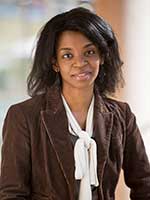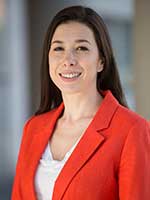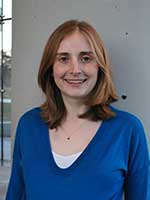

Celebrating Graduate Student Research
Celebrating Graduate Student Research
On Monday March 24, 2014, the 18th annual Julius Marmur Symposium—A Graduate Student Research Symposium, held in the third-floor lecture hall in the Leo Forchheimer Medical Sciences Building, recognized three outstanding Einstein graduate students: Dr. Michelle Antoine; Ms. Adina Buxbaum; and Dr. Carlyn Patterson.

Michelle Antoine, Ph.D.Dr. Antoine’s award-winning research, published in Science on September 6, 2013, provides a biological explanation for the high prevalence of behavioral problems in children with inner ear defects. The research, which she completed in the laboratory of Dr. Jean Hébert, began serendipitously when a mouse model she was studying spontaneously developed a mutation resulting in hyperactivity and deafness.
“Winning the award is a nod to all the people who have supported me,” she said. “It’s also an acknowledgment that if you’re persistent and work hard, one day something good will happen.” Growing up on the Caribbean island of Trinidad, Dr. Antoine didn’t know she could have a career as a scientist. “You could be a doctor, a lawyer, a teacher, but no one spoke about the possibility of being a scientist.”
During an internship with the Nobel Laureate, Dr. Leland Hartwell, at the Fred Hutchinson Cancer Research Center, she fell in love with research and made the decision to pursue a scientific career. “He let me tinker and encouraged me to explore science and just figure things out for myself.” Following the successful defense of her thesis, she received a competitive fellowship from the Miller Institute for Basic Research in Science at the University of California, Berkeley, where she continues her research in how sensory defects contribute to behavior change.

Adina BuxbaumMs. Buxbaum, a graduate student in the laboratory of Dr. Robert Singer, received the award in recognition of research published in Science on January 24, 2014, which describes assays she developed to study how RNA translation is regulated in neurons. “When translation in neurons goes wrong, it contributes to mental disability,” Ms. Buxbaum explained. “To understand where these processes go wrong it’s important to know how they work. The assays I’ve developed can be used to study models of neurological diseases.”
Presenting at the symposium had special significance for Ms. Buxbaum. “As an incoming student I was taken to the Marmur Symposium. I realized then that this is the kind of research I wanted to do. It’s truly fulfilling to come full circle and to be appreciated for all the hard work. It’s the best award you can get as a student at Einstein.”

Carlyn Patterson, Ph.D.Dr. Patterson, an M.D.-Ph.D. student in Einstein’s Medical Scientist Training Program, completed her graduate studies in the laboratory of Dr. Adam Kohn. She is currently finishing her fourth year of medical studies. Her research into visual system adaptations has produced three first-author manuscripts, most recently in Neuron, one of the most influential journals in the field of neuroscience.
She explained, “The visual system is organized hierarchically. I wanted to understand how changes lower down in this system, in an area known as the visual cortex, affect the whole visual system. We found that changes in the visual cortex disrupted functioning of higher systems.”
She added, “Winning the award is very humbling; there are many great student researchers at Einstein. I’m excited to have the opportunity to share my work before leaving for my residency.” On Friday, March 21, Dr. Patterson learned she will begin her residency in pediatric neurology at Children's Hospital of Philadelphia.
“I love doing research and seeing patients. I see myself applying this systems-level approach to childhood diseases such as epilepsy and neurodevelopmental diseases.”
All three winners acknowledged the spirit of collaboration and the supportive environment that Einstein offers its graduate students as important factors of their success.
The Marmur Symposium is part of a full day devoted to celebrating the achievements of Einstein graduate students. Beginning with a breakfast reception at 9:30 a.m., the event then focuses on presentations from the student awardees of their published research, followed by the award ceremony. It culminates with a poster session showcasing research from all graduate students, and a reception, held from 2:30 to 4:30 p.m. in Lubin Dining Hall.
The symposium was created to honor the memory of Dr. Julius Marmur, a distinguished professor at Einstein, for his role as one of the founding fathers of molecular biology and for his dedication to graduate student education.
Posted on: Friday, March 28, 2014

Tablet Blog